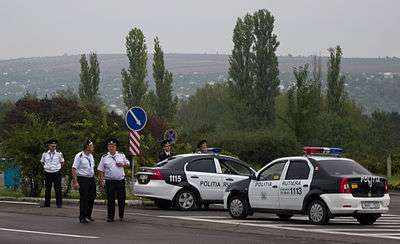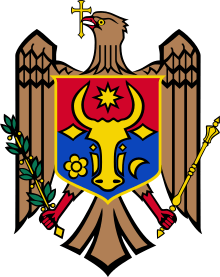Crime in Moldova
Crime in Moldova, as everywhere in former Soviet republics, has risen dramatically since the fall of the Soviet Union. Economic and drug-related crimes, the most visible and predictable results of the deteriorating economic situations in the newly independent countries, have simply overwhelmed the human and financial resources devoted to them.
Crime by type
Murder
In 2012, Moldova had a murder rate of 6.5 per 100,000 population.[1] There were a total of 229 murders in Moldova in 2012.[1]
Drug trade
Illicit cultivation of opium poppies and cannabis is carried out in Moldova, mainly for consumption in CIS countries. According to NATO, drug trafficking in Moldova is valued between $200 million to $250 million per year.[2]
Moldova is a transshipment point for illegal drugs to Western Europe.
Human trafficking
The CIA names human trafficking, widespread crime and underground economic activity among major crime issues of Moldova.[3] Moldova is a source and transit nation in the trafficking in human beings, in particular women and girls into forced prostitution. The annual country human rights report from the United States Department of State pinpoints some involvement by government officials and Moldovan law enforcement in human trafficking.
The United States Department of State issued a report in 2006 on human rights violations in Moldova[4] stating:
"The country was a major country of origin for women and children trafficked abroad for forced prostitution and men and children who were trafficked to Russia and neighboring countries for forced labor and begging. The country was also a transit country for victims trafficked from Ukraine to Romania. Women and girls were trafficked to Turkey, Cyprus, Italy, Hungary, and the Balkan countries for prostitution. NGOs reported recent cases of victims trafficked to Saudi Arabia and Afghanistan. Women and girls reportedly were trafficked to Italy and Greece through Romania, Serbia and Montenegro, and Albania. According to the International Organization for Migration (IOM), victims have increasingly been directed to Asia, Russia, Turkey, Western Europe, and the Middle East. The IOM reported that the country was the main origin in Europe for women and children trafficked for forced prostitution."
Between 1991 and 2008, 400,000 women were trafficked from Moldova.[5]
Human rights violations
Torture and ill-treatment in Moldova is widespread and systemic despite some initial legislative steps made by the government to change police practices in order to eradicate it, Amnesty International said in October 2007.[6] "Although efforts have been made to bring legislation into line with international and European standards, practice and attitudes are lagging behind. Beatings and abuse of detainees remain the norm. Channels for seeking redress stay blocked. Lack of transparency breeds impunity," Amnesty International's researcher said.[7]
The events during the April 2009 Moldova civil unrest drew criticism of human rights violations.
See also
References
- 1 2 Global Study on Homicide. United Nations Office on Drugs and Crime, 2013.
- ↑ "Drug Trafficking in Moldova".
- ↑ CIA World factbook: Moldova
- ↑ Moldova: 2005 country report on human rights practices
- ↑ "400000 women sold into human trafficking from Moldova".
- ↑ "Moldova: Police torture and ill-treatment: "It's just normal."". Amnesty International. 23 October 2007.
- ↑ "Moldova: Urgent measures needed to stop torture or other ill-treatment". Amnesty International USA. 23 October 2007.
External links
- "Balkans urged to curb trafficking, from BBC
- "Moldova: Young Women From Rural Areas Vulnerable To Human Trafficking", from RFE/RL
- "Human Trafficking & Modern-day Slavery - Republic of Moldova"
- Moldova Black Markets-Havocscope Black Markets
- Moldova Crime News

